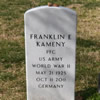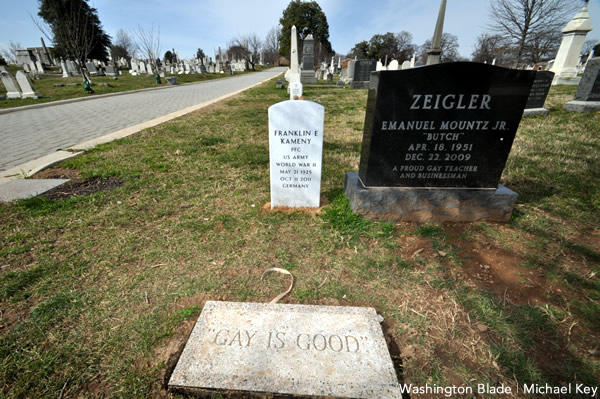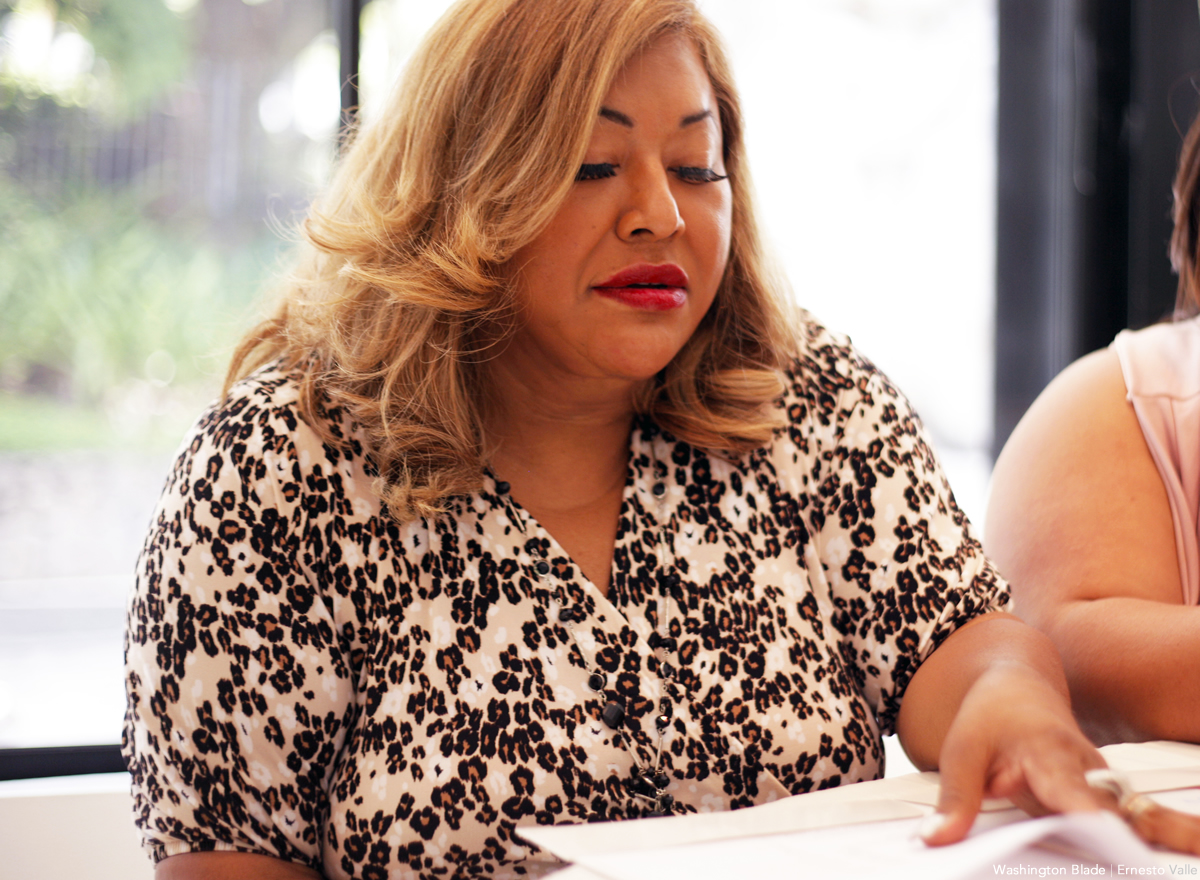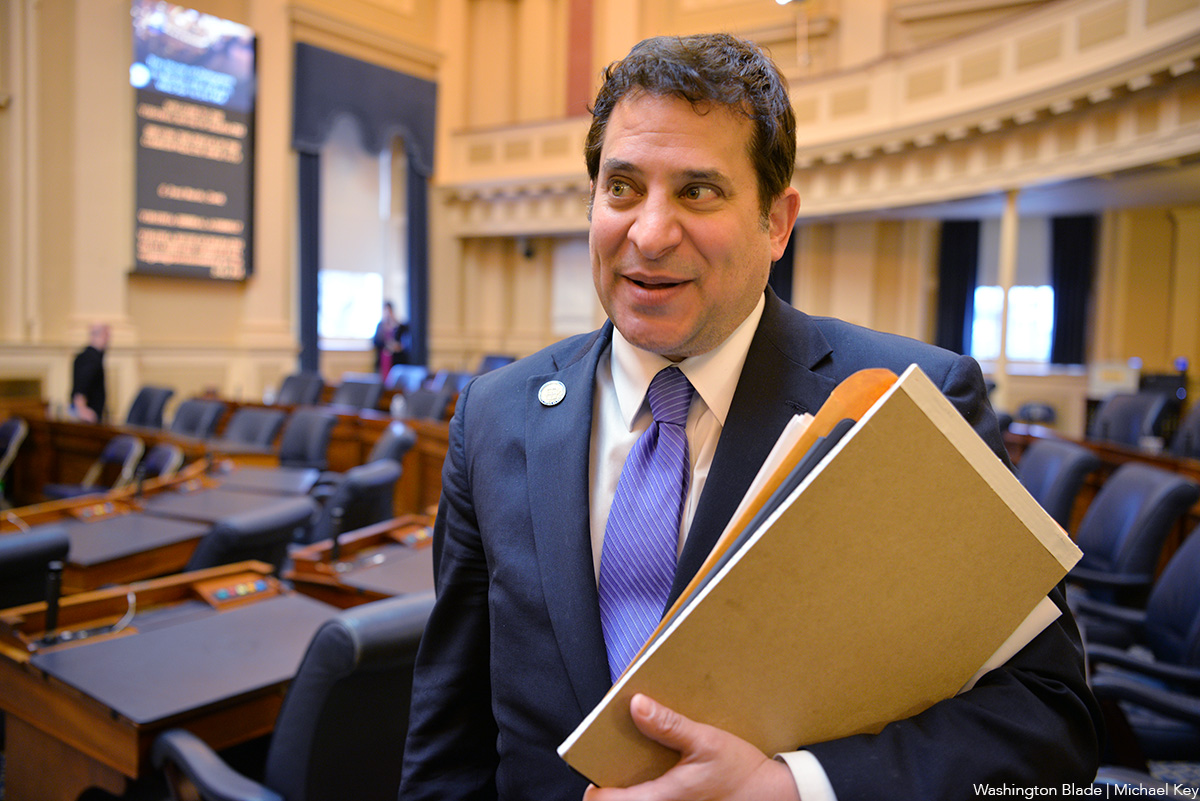Local
Kameny estate dispute sparks lawsuits
Gay rights pioneer’s burial ceremony postponed


Frank Kameny’s March 3 burial was postponed, but his headstone and grave marker are now in place and are open for visitors at the cemetery, which is located at 18th Street and Potomac Avenue, S.E. (Washington Blade photo by Michael Key)
The man named by the late gay rights pioneer Frank Kameny as the main beneficiary of his estate has filed separate lawsuits against four of Kameny’s longtime friends and fellow activists, charging that they “wrongfully” removed property from Kameny’s house shortly after his death last October.
The lawsuits, which were filed in D.C. Superior Court on March 3 and March 5, came days after one of the men now named as a defendant, Bob Witeck, announced that a March 3 ceremony for the interment of Kameny’s ashes at Congressional Cemetery had been postponed in “deference” to Kameny’s estate.
“Timothy Lamont Clark, the Personal Representative of the Estate of Dr. Franklin E. Kameny, filed Complaints for Writ of Replevin against Dr. Marvin Carter, Charles Francis, Richard Rosendall, and Robert ‘Bob’ Witeck in the Superior Court of the District of Columbia Civil Division,” says a statement released by attorney Glen Ackerman, who is representing Clark and the Kameny estate.
“The Estate alleges that Messrs. Carter, Francis, Rosendall, and Witeck removed property belonging to the Estate of Dr. Kameny without authority or permission,” Ackerman says in the statement. “The Estate is seeking immediate recovery of the property wrongfully taken.”
Witeck and Rosendall said they had no immediate comment on the lawsuits. Rande Joiner, an attorney saying she represents Francis, said Francis also would have no comment. Carter did not respond to an email and phone message seeking comment.
U.S. Legal.com, a website specializing in legal issues, describes “Replevin” as an “action or writ issued to recover an item of personal property wrongfully taken.” It says it can be used as a legal remedy “in which a court requires a defendant to return specific goods to the plaintiff at the beginning of the action” while the case is awaiting trial.
The suits allege that some or all of the defendants improperly removed from Kameny’s house his personal papers; a U.S. Army uniform of Kameny’s; a statue; “Gay is Good” pins; and “personal and historical photographs,” among other items.
The lawsuit also claims Francis is required to hand over to the estate the “posthumous certificate awarded to Franklin Edward Kameny by the American Astronomical Society on January 10, 2012.”
Francis said in a press release earlier this year that he traveled to Texas at the invitation of the astronomical society to accept the award on Kameny’s behalf.
The lawsuits say each of these items “belong to the Plaintiff and the Estate of Franklin Edward Kameny” and are of “unknown historical value and of a monetary value yet to be determined.”
Ackerman told the Blade that Francis, Witeck, Rosendall, and Carter removed the items from Kameny’s house in November.
Rosendall and Witeck told the Blade earlier this year that Clark, who was living in the house at the time, gave them permission to take the items to preserve them for safekeeping, with the intent of returning the items to the estate.
The two said Clark, who inherited Kameny’s house, told them he was about to have the house cleaned to prepare for placing it on the market for sale and was ready to dispose of many of the remaining items in the house as trash.
Rosendall told the Blade last week that he, Witeck, and Carter became alarmed that important papers and other items needed to preserve Kameny’s legacy were in danger of being discarded and lost. He said Clark had no objections to their temporarily taking possession of the items and allowed them access to the house.
Ackerman this week said Clark disputes that characterization of what happened. According to Ackerman, Clark says he never told Witeck, Francis, Rosendall, or Carter that he planned to throw away the items in question. Ackerman said Clark feels he was misled by the men into thinking they had the legal right to take the items from the house.
“At that time he didn’t understand the legal issues of all of this,” Ackerman said.
Activists helped Kameny in last years
Kameny’s will, which names Clark as Kameny’s personal representative for the estate, also names Clark as the sole beneficiary of Kameny’s house, car, and all other possessions except his papers, which Kameny bequeathed to the Library of Congress.
Activists who know Witeck, Francis, Carter, and Rosendall credit them with helping Kameny financially in the last years of his life. Carter, founder and executive director of the local charitable group Helping Our Brothers and Sisters (HOBS), arranged for the group to raise money to help Kameny pay his bills at a time when he was in financial need.
Francis founded the Kameny Papers Project, which arranged for the Library of Congress in 2007 to take possession of thousands of Kameny’s papers and documents that cover the gay rights leader’s work on behalf of LGBT equality over a 50-year period.
The project, under Francis’ and Witeck’s direction, raised more than $75,000 from donors to buy the papers from Kameny, giving him needed financial support, and donate them to the Library of Congress, where they are available to researchers.
Ackerman said he recognizes the contributions of the four men on Kameny’s behalf. But he said that he and Clark are legally obligated in probating Kameny’s will to keep an accurate inventory of all of Kameny’s property. All of the items taken from the house belong to Clark under the terms of Kameny’s will, Ackerman said.
He said Francis has declined to say why he has yet to deliver the Kameny papers he took from the house shortly after Kameny’s death to the Library of Congress.
“It’s almost six months since Dr. Kameny died,” Ackerman said. “What is it taking so long for him to give those papers to the Library of Congress?”
He said he was troubled to learn from Joiner, Francis’s lawyer, that Francis and the others have agreed to return the items they took from the house but only if the estate issues a legal waiver releasing them from any liability associated with the estate or Clark.
Ackerman said the estate refuses to agree to such a waiver.
“Why do they want to be released from liability if they didn’t do anything wrong?” he said.
Interment delayed over gravesite ownership
The abrupt postponement of the March 3 interment ceremony for Kameny’s ashes at D.C.’s historic Congressional Cemetery startled many of the activists who knew Kameny and planned to attend.
Patrick Crowley, interim senior manager for Congressional Cemetery, said Witeck informed him on March 2, one day before the ceremony was to take place, that he and the other organizers of the event wanted to call it off.
“All I can say is there is a disagreement between the parties that own the plot and the estate of Mr. Kameny,” Crowley said.
Crowley said HOBS, operated by Carter, purchased the gravesite earlier this year.
Ackerman said HOBS along with Francis and Witeck announced plans for the burial service without consulting Clark or the Kameny estate. He said Clark, who has legal rights to the ashes and planned to take possession of them, was not informed in advance of the burial plans and was “completely excluded” from the entire process of obtaining a cemetery plot and planning the interment of the ashes.
When Clark asked about the ashes last year, he was told they already had been buried, Ackerman said Clark told him. Ackerman said he and Clark did not learn that the ashes had not been buried until last month, when he saw a press release about plans for the interment and a cemetery official told him the ashes were in an urn at the cemetery office.
With this as a backdrop, Ackerman said he informed the cemetery and Francis, Witeck, and Carter, through attorney Joiner that the estate would not allow the interment of the ashes to take place until HOBS signed over ownership of the cemetery plot to the estate.
The estate would pay HOBS for the plot and other burial related expenses, Ackerman said.
He said HOBS agreed to do this but informed him that the HOBS board could not make arrangements to approve the sale in time for the ceremony. Ackerman said the estate had no objections to holding the gravesite ceremony but it could not agree to the burial of the ashes until the estate gained legal ownership of the plot.
Reached by phone March 2, Witeck acknowledged that the interment ceremony was being postponed due to issues related to the Kameny estate, but he declined to provide further details on the reason for the postponement, including whether organizers didn’t want a ceremony if the ashes could not be interred.
Editor’s note: The law firm Ackerman Brown PLCC, of which Glen Ackerman is managing partner, represents the Washington Blade.
District of Columbia
Ruby Corado sentenced to 33 months in prison
Former Casa Ruby director pleaded guilty to wire fraud in 2024

A federal judge on Jan. 13 sentenced Ruby Corado, the founder and former executive director of the now closed D.C. LGBTQ community services organization Casa Ruby, to 33 months of incarceration for a charge of wire fraud to which she pleaded guilty in July 2024.
U.S. District Court Judge Trevor M. McFadden handed down the sentence that had been requested by prosecutors with the Office of the U.S. Attorney for the District of Columbia after Corado’s sentencing had been postponed six times for various reasons.
The judge also sentenced her to 24 months of supervised release upon her completion of incarceration.
In addition to the sentence of incarceration, McFadden agreed to a request by prosecutors to hold Corado responsible for “restitution” and “forfeiture” in the amount of $956,215 that prosecutors have said she illegally misappropriated from federal loans obtained by Casa Ruby.
The charge to which she pleaded guilty is based on allegations that she diverted at least $180,000 “in taxpayer backed emergency COVID relief funds to private offshore bank accounts,” according to court documents.
Court records show FBI agents arrested Corado on March 5, 2024, at a hotel in Laurel, Md., shortly after she returned to the U.S. from El Salvador, where authorities say she moved in 2022. Prosecutors have said in charging documents that she allegedly fled to El Salvador, where she was born, after “financial irregularities at Casa Ruby became public,” and the LGBTQ organization ceased operating.
Shortly after her arrest, another judge agreed to release Corado into the custody of her niece in Rockville, Md., under a home detention order. But at an Oct. 14, 2025, court hearing at which the sentencing was postponed after Corado’s court appointed attorney withdrew from the case, McFadden ordered Corado to be held in jail until the time of her once again rescheduled sentencing.
Her attorney at the time, Elizabeth Mullin, stated in a court motion that her reason for withdrawing from the case was an “irreconcilable breakdown in the attorney-client relationship.”
Corado’s newly retained attorney, Pleasant Brodnax, filed a 25-page defense Memorandum in Aid of Sentencing on Jan. 6, calling for the judge to sentence Corado only to the time she had already served in detention since October.
Among other things, Brodnax’s defense memorandum disputes the claim by prosecutors that Corado improperly diverted as much as $956,215 from federally backed loans to Casa Ruby, saying the total amount Corado diverted was $200,000. Her memo also states that Corado diverted the funds to a bank account in El Salvador for the purpose of opening a Casa Ruby facility there, not to be used for her personally.
“Ms. Corado has accepted responsibility for transferring a portion of the loan disbursements into another account she operated and ultimately transferring a portion of the loan disbursements to an account in El Salvador,” the memo continues.
“Her purpose in transferring funds to El Salvador was to fund Casa Ruby programs in El Salvador,” it says, adding, “Of course, she acknowledges that the terms of the loan agreement did not permit her to transfer the funds to El Salvador for any purpose.”
In his own 16-page sentencing recommendation memo, Assistant U.S. Attorney John Borchert, the lead prosecutor in the case, said Corado’s action amounted at the least to fraud.
“The defendant and Casa Ruby received no less than $1.2 million in taxpayer backed funds during the COVID-19 global health crisis,” he memo states. “But rather than use those funds to support Casa Ruby’s mission as the defendant promised, the defendant further contributed to its demise by unlawfully transferring no less than $180,000 of these federal emergency relief funds into her own private offshore bank accounts,” it says.
“Then, when media reports suggested the defendant would be prosecuted for squandering Casa Ruby’s government funding, she sold her home and fled the country,” the memo states. “Meanwhile, the people who she had promised to pay with taxpayer-backed funds – her employees, landlord, and vendors – were left behind flat broke.”
A spokesperson for the U.S. Attorney’s office and Corado’s attorney didn’t immediately respond to a request from the Washington Blade for comment on the judge’s sentence.
“Ms. Corado accepts full responsibility for her actions in this case,” defense attorney Brodnax says in her sentencing memo. “She acknowledges the false statements made in the loan applications and that she used some of the money outside the United States,” it says.
“However, the money was still utilized for the same purpose and intention as the funds used in the United States, to assist the LGBTQ community,” it states. “Ms. Corado did not use the money to buy lavish goods or fund a lavish lifestyle.”
Brodnax also states in her memo that as a transgender woman, Corado could face abuse and danger in a correctional facility where she may be sent if sentenced to incarceration.
“Ruby Corado committed a crime, she is now paying the price,” said D.C. LGBTQ rights advocate Peter Rosenstein. “While it is sad in many ways, we must remember she hurt the transgender community with what she did, and in many ways they all paid for her crime.”
Virginia
Woman arrested for anti-gay assault at Alexandria supermarket
Victim recorded video of Christmas Day attack

Alexandria police announced on Jan. 12 that a Maryland woman has been arrested for allegedly assaulting a man while shouting anti-gay slurs at him at a Giant supermarket in Alexandria on Christmas Day.
The arrest came after a video of the assault that the victim captured with his phone and on which the woman can be heard shouting anti-gay slurs went viral on social media.
Police identified the woman as Shibritney Colbert, 34, of Landover, Md. Alexandria Police Chief Tarrick McGuire stated at a news conference that police responded to a 911 call placed by the victim and attempted to apprehend the woman, but she drove off in her car before police could apprehend her.
He said following an investigation, Colbert was apprehended and arrested in Prince Goerge’s County, Md., on Jan. 8. He said arrangements were being made for her to be brought to Alexandria where she was expected to face charges of assault and battery, destruction of property, felony eluding, and driving an unregistered vehicle.
The video of the incident shows Colbert pushing a shopping cart she was using in an aisle at the Giant store, located at 3131 Duke St., into the victim and another woman who was trying to help the victim. She can be seen throwing groceries at the victim while shouting anti-gay names. “Boy, get out of here with your gay ass,” was among the words she yelled at him that could be heard on the video.
The victim, who police identified only as a 24-year-old man, could be heard on the video saying he does not know the woman and urging her to “please back up.”
“Based on the victim’s statement, comments exchanged prior to the assault, and the totality of the circumstances, investigators believe the victim was targeted because of his sexual orientation,” police said in a statement.
Tarrick said Colbert’s arrest came at a time when Alexandria police were completing a strengthened hate crime policy calling for detectives to investigate crimes based on hate and for the department to prepare reports on hate crimes twice a year.
“Hate crimes are not just crimes against individuals, they are offenses that threaten the entire community and undermine the fundamental principles of dignity, equality, and safety,” Tarrick said.
Alexandria police didn’t immediately respond to a request from the Washington Blade for a copy of the official police report on the incident.
A link to the video posted on the social media site Reddit in which an unidentified man provides some details of the attack, can be accessed here:
Virginia
Mark Levine running in ‘firehouse’ Democratic primary to succeed Adam Ebbin
Outgoing gay Va. state senator has endorsed Elizabeth Bennett-Parker

Gay former Virginia House of Delegates member Mark Levine (D-Alexandria) is one of four candidates running in a hastily called “firehouse” Democratic primary to be held Tuesday, Jan. 13, to select a Democratic nominee to replace gay state Sen. Adam Ebbin (D-Alexandria)
Ebbin, whose 39th Senate District includes Alexandria and parts of Arlington and Fairfax Counties, announced on Jan. 7 that he was resigning effective Feb. 18, to take a job in the administration of Gov.-elect Abigail Spanberger.
The Jan. 13 primary called by Democratic Party leaders in Alexandria and Arlington will take place less than a week after Ebbin announced his planned resignation.
According to the Community News of Alexandria publication, a public debate between the four candidates was scheduled to take place one day earlier on Monday, Jan. 12, from 7-9 p.m. at the Charles Houston Recreation Center in Alexandria.
The winner of the so-called firehouse primary will compete in a Feb. 10 special election in which registered voters in the 39th District of all political parties and independents will select Ebbin’s replacement in the state Senate.
The other candidates competing in the primary on Tuesday, in addition to Levine, include state Del. Elizabeth Bennett-Parker, former Alexandria Vice Mayor Amy Jackson, and World Wildlife Fund executive Charles Sumpter.
Another Alexandria news publication, ALXnow, reports that Ebbin, Spanberger, and at least four other prominent Democrats in the Virginia General Assembly have endorsed Bennett-Parker, leading political observers to view her as the leading contender in the race.
“I have worked alongside Elizabeth and have seen her fight for the values of our community,” Ebbin said in a statement, ALXnow reports.
Arlington gay Democratic activist TJ Flavall said Parker-Bennett has attended LGBTQ community events and is known as an LGBTQ ally.
Ebbin’s endorsement of Bennett-Parker over fellow gay politician Levine in the Jan. 13 firehouse primary follows what observers have said is a longstanding rivalry between the two over disagreements around legislative issues.
In 2021, Ebbin endorsed Parker-Bennett when she challenged Levine in the Democratic primary for his House of Delegates seat in the then 45th House District in Alexandria.
Parker-Bennett defeated Levine in that race at a time when Levine, in an unusual move, also ran for the position of lieutenant governor. He also lost that race.
ALXnow reports that in his Facebook announcement of his candidacy for Ebbin’s state Senate seat Levine discounted the relevance of the large number of prominent endorsements that Parker-Bennet has received. In campaigns that last for just a few days rather than weeks or months, “it’s about turnout,” ALX now quoted him as saying.
Levine, an attorney, has a longstanding record as an LGBTQ rights advocate. He worked as a legislative counsel to gay former U.S. Rep. Barney Frank (D-Mass.) before becoming a radio talk show host and TV political commentator in Virginia prior to his election to the Virginia House of Delegates.
The firehouse primary on Jan. 13, which is open only to voters with identification showing they live in the 39th District, will take place from 8:30 a.m. to 7 p.m. in these locations:
Alexandria: Charles E. Beatley, Jr. Public Library, 5005 Duke St.; and the Charles Houston Recreation Center, 901 Wythe St.
Arlington: Aurora Hills Library, 735 18th St. S.
Annandale: New John Calvin Presbyterian Church, 6531 Columbia Pike



















